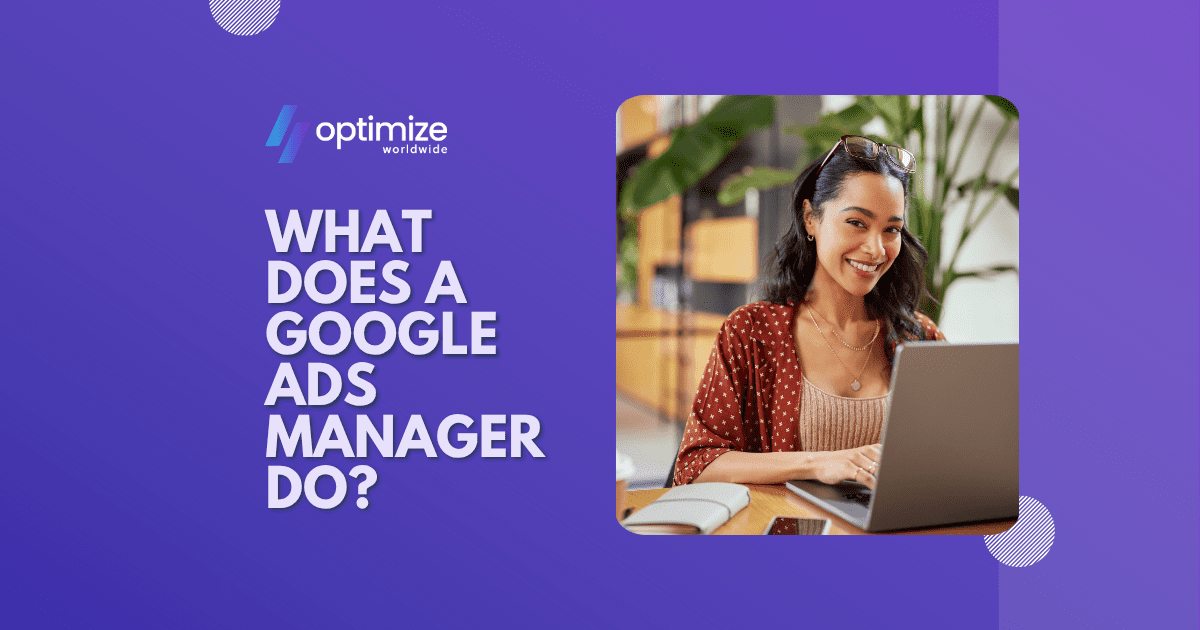If your business is investing in paid Google advertising, you’re already one step closer to reaching your ideal customers. But knowing how to run effective ad campaigns is another matter entirely. That’s where a Google Ads manager comes in.
Whether you’re working with a freelancer or a full Google Ads digital advertising agency, a Google Ads manager plays a central role in getting the most out of your ad spend. From targeting the right audience to tracking conversions, they help your business generate meaningful traffic, leads, and sales—while minimizing waste and guesswork.
In this post, we’ll break down what a Google Ads manager actually does, what makes their role essential, and how they fit into a broader digital marketing ad agency team. You’ll also find resources on what to expect from a quality provider and how to choose the right agency for your business.

The Core Role of a Google Ads Manager
A Google Ads manager oversees the strategy, execution, optimization, and performance tracking of your Google Ads campaigns. Their goal is to deliver a high return on your advertising investment by ensuring your ads reach the right people, at the right time, with the right message.
This includes:
1. Campaign Strategy and Planning
Before launching anything, a Google Ads manager will work with you (or your team) to understand your goals—whether it’s increasing website traffic, generating leads, boosting e-commerce sales, or building brand awareness. They then build a campaign strategy based on your objectives, industry, target audience, and budget.
2. Keyword Research and Audience Targeting
Using research tools and analytics, the manager identifies high-performing keywords and negative keywords to avoid wasted clicks. They also set up targeting criteria like location, device type, interests, and behaviors to make sure your ads are seen by the most relevant potential customers.
3. Writing and Testing Ad Copy
A strong Google advertising agency knows that ad creative makes a big impact. Google Ads managers write compelling headlines, descriptions, and calls to action—and then test different variations to improve click-through and conversion rates.
4. Budget Allocation and Bid Management
Your manager ensures every dollar you spend is used wisely. They adjust bidding strategies based on campaign goals, competition, and seasonality to get the most visibility for the lowest cost-per-click.
5. Landing Page Review and Optimization
No matter how good your ads are, they won’t convert if your landing pages don’t perform. A savvy PPC Ads agency will audit your destination pages and suggest improvements for design, speed, content, and conversion flow.
6. Ongoing Campaign Optimization
Google Ads managers don’t just “set it and forget it.” They monitor performance daily or weekly and make data-informed adjustments. This might include tweaking targeting, pausing underperforming ads, increasing bids for top-converting keywords, or adjusting ad schedules.
7. Reporting and Performance Analysis
Your Google ads company should provide transparent, easy-to-understand reports that track key metrics like clicks, impressions, conversion rate, cost-per-click, and return on ad spend (ROAS). A great manager turns this data into insights and clear next steps.

Google Ads Manager vs. Google Ads Agency
Some businesses hire a solo Google Ads manager, while others work with a full-service Google Ads agency. In the latter case, the manager is part of a larger team that may include graphic designers, landing page developers, SEO strategists, and content marketers.
Working with a digital marketing ad agency gives you access to cross-functional expertise and tools, but no matter the structure, your manager should be your primary point of contact and strategist.
Not sure what to look for? Here’s a helpful guide on what to expect from a Google Ads management service.
How Much Input Should You Have?
A good advertising agency values transparency and collaboration. While you should trust your manager to handle the technical work, they should still loop you in on strategy, budget planning, and major optimizations.
Expect regular updates and the ability to review reports, ad creative, and landing pages. You don’t need to be an expert—that’s why you hired one—but you should always know what your money is doing and where your results stand.
Choosing the Right Partner
The right Google ad management services will not only boost your ROI—they’ll give you confidence that your marketing is in capable hands. Before committing to an agency or manager, ask the following:
- Do they have experience in your industry?
- Can they share success stories or case studies?
- How often will they report on performance?
- What tools and platforms do they use?
- Are they Google-certified or officially recognized as a partner?
If you’re not sure where to start, check out our guide on how to choose the right Google Ads agency for your business. It outlines key factors like pricing, communication style, and transparency that can make or break your partnership.
A Google Ads manager is more than a technician—they’re a strategist, analyst, and advocate for your success. With expert guidance, continuous optimization, and a clear focus on ROI, they ensure that your paid Google advertising is a smart investment—not a costly experiment.
Whether you’re working with a solo professional or a full-service PPC Ads agency, the right manager can unlock tremendous growth and visibility for your business.
Want to work with an experienced Google Ads manager who knows how to get results?
Give us a call or send a message through our website to start the conversation. Let’s talk about how smart Google Ads management can help your business grow.
